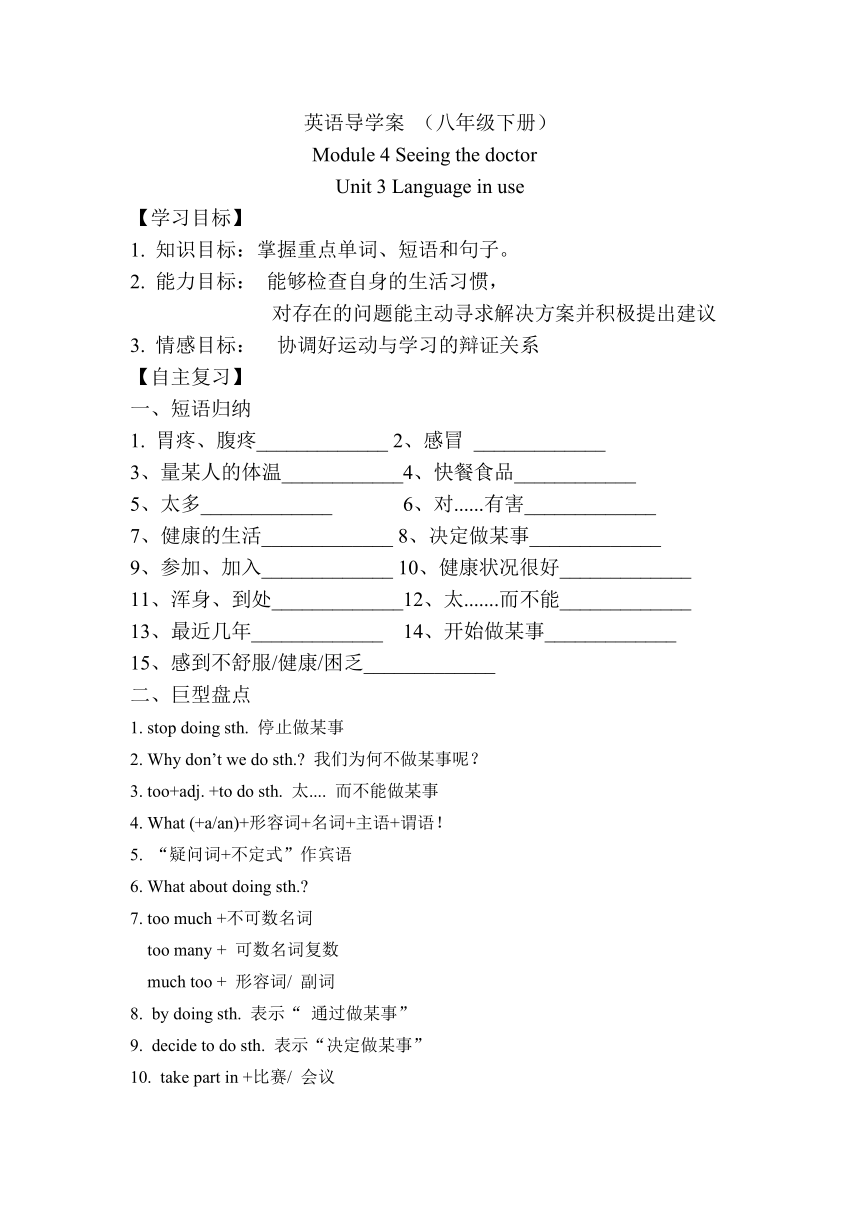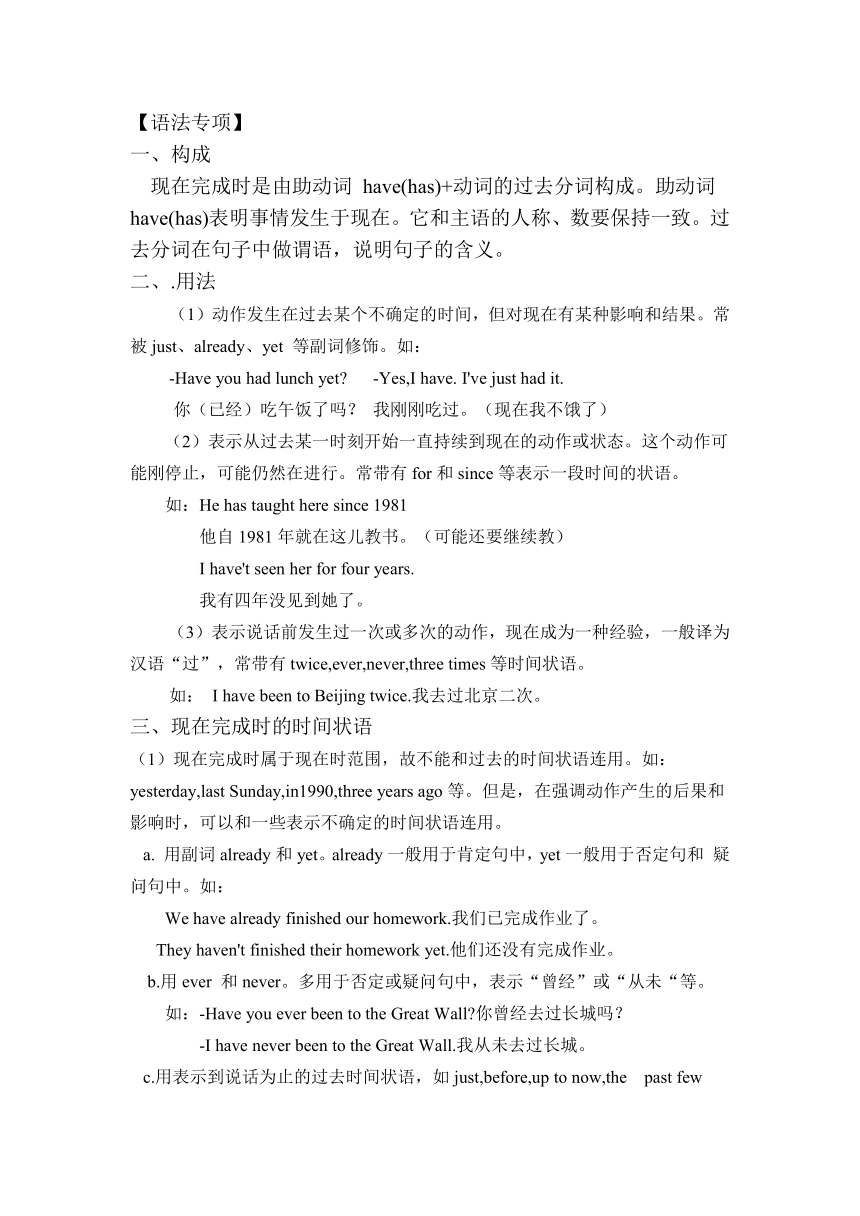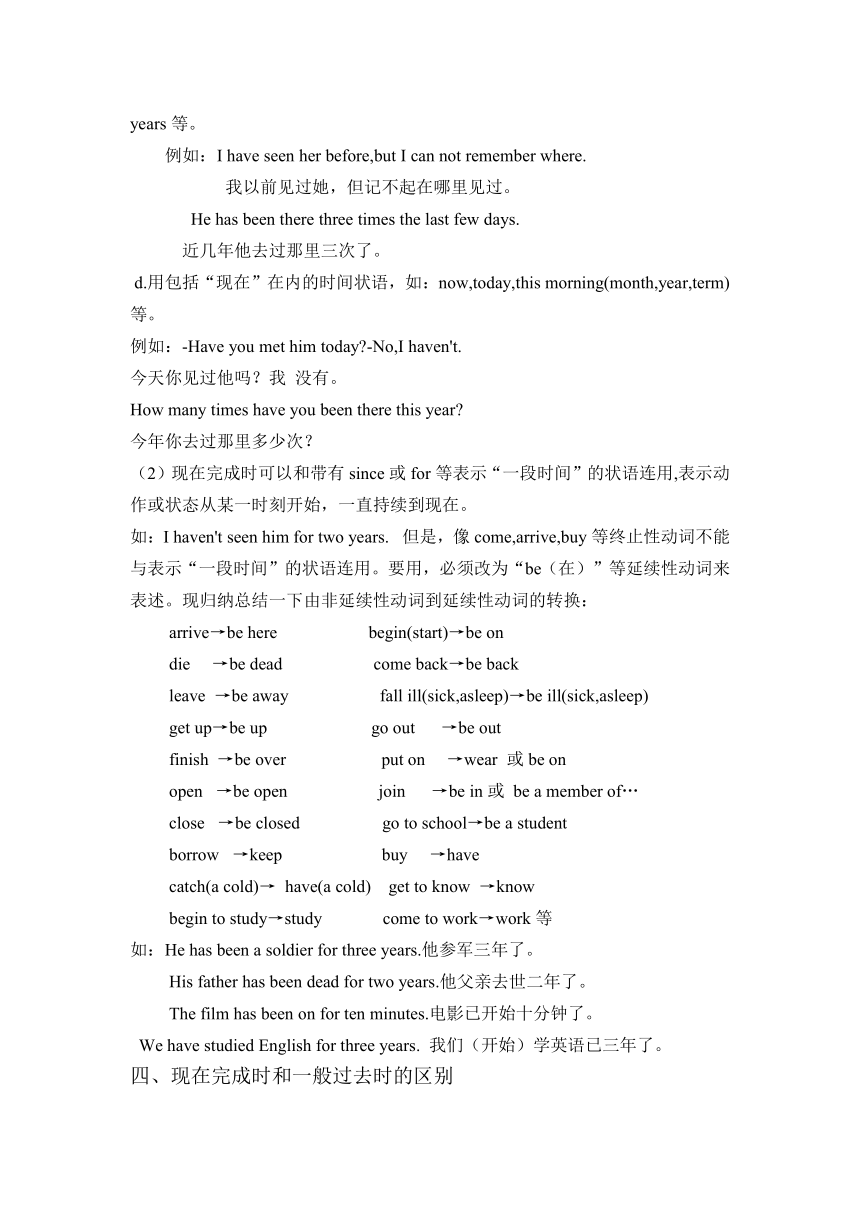Module 4 Seeing the doctor unit3 language in use导学案(1课时)
文档属性
| 名称 | Module 4 Seeing the doctor unit3 language in use导学案(1课时) |

|
|
| 格式 | zip | ||
| 文件大小 | 15.8KB | ||
| 资源类型 | 教案 | ||
| 版本资源 | 外研版 | ||
| 科目 | 英语 | ||
| 更新时间 | 2015-04-26 00:00:00 | ||
图片预览



文档简介
英语导学案 (八年级下册)
Module 4 Seeing the doctor
Unit 3 Language in use
【学习目标】
知识目标:掌握重点单词、短语和句子。
能力目标: 能够检查自身的生活习惯,
对存在的问题能主动寻求解决方案并积极提出建议
情感目标: 协调好运动与学习的辩证关系
【自主复习】
短语归纳
胃疼、腹疼_____________ 2、感冒 _____________
量某人的体温____________4、快餐食品____________
5、太多_____________ 6、对......有害_____________
7、健康的生活_____________ 8、决定做某事_____________
9、参加、加入_____________ 10、健康状况很好_____________
11、浑身、到处_____________12、太.......而不能_____________
13、最近几年_____________ 14、开始做某事_____________
15、感到不舒服/健康/困乏_____________
二、巨型盘点
1. stop doing sth. 停止做某事
2. Why don’t we do sth. 我们为何不做某事呢?
3. too+adj. +to do sth. 太.... 而不能做某事
4. What (+a/an)+形容词+名词+主语+谓语!
5. “疑问词+不定式”作宾语
6. What about doing sth.
7. too much +不可数名词
too many + 可数名词复数
much too + 形容词/ 副词
by doing sth. 表示“ 通过做某事”
decide to do sth. 表示“决定做某事”
take part in +比赛/ 会议
【语法专项】
一、构成
现在完成时是由助动词 ( http: / / www.21cnjy.com )have(has)+动词的过去分词构成。助动词have(has)表明事情发生于现在。它和主语的人称、数要保持一致。过去分词在句子中做谓语,说明句子的含义。
二、.用法
(1)动作发生在过去某个不确定的时间,但对现在有某种影响和结果。常被just、already、yet 等副词修饰。如:
-Have you had lunch yet -Yes,I have. I've just had it.
你(已经)吃午饭了吗? 我刚刚吃过。(现在我不饿了)
(2)表示从过去某一时刻开始一直持续到现在的动作或状态。这个动作可能刚停止,可能仍然在进行。常带有for和since等表示一段时间的状语。
如:He has taught here since 1981
他自1981年就在这儿教书。(可能还要继续教)
I have't seen her for four years.
我有四年没见到她了。
(3)表示说话前发生过一次或多次的动作,现在成为一种经验,一般译为汉语“过”,常带有twice,ever,never,three times等时间状语。
如: I have been to Beijing twice.我去过北京二次。
三、现在完成时的时间状语
(1)现在完成时属于现在时范围,故不能和过去的时间状语连用。如:yesterday,last Sunday,in1990,three years ago等。但是,在强调动作产生的后果和影响时,可以和一些表示不确定的时间状语连用。
a. 用副词already和yet。already一般用于肯定句中,yet一般用于否定句和 疑问句中。如:
We have already finis ( http: / / www.21cnjy.com )hed our homework.我们已完成作业了。
They haven't finished their homework yet.他们还没有完成作业。
b.用ever 和never。多用于否定或疑问句中,表示“曾经”或“从未“等。
如:-Have you ever been ( http: / / www.21cnjy.com ) to the Great Wall 你曾经去过长城吗?
-I have never been to the Great Wall.我从未去过长城。
c.用表示到说话为止的过去时间状语,如just,before,up to now,the past few years等。
例如:I have seen her before,but I can not remember where.
我以 ( http: / / www.21cnjy.com )前见过她,但记不起在哪里见过。
He has been there three times the last few days.
近几年他去过那里三次了。
( http: / / www.21cnjy.com ) d.用包括“现在”在内的时间状语,如:now,today,this morning(month,year,term)等。
例如:-Have you met him today -No,I haven't.
今天你见过他吗?我 没有。
How many times have you been there this year
今年你去过那里多少次?
(2)现在 ( http: / / www.21cnjy.com )完成时可以和带有since或for等表示“一段时间”的状语连用,表示动作或状态从某一时刻开始,一直持续到现在。
如:I haven't seen ( http: / / www.21cnjy.com )him for two years. 但是,像come,arrive,buy等终止性动词不能与表示“一段时间”的状语连用。要用,必须改为“be(在)”等延续性动词来表述。现归纳总结一下由非延续性动词到延续性动词的转换:
arrive→be here begin(start)→be on
die →be dead come back→be back
leave →be away fall ill(sick,asleep)→be ill(sick,asleep)
get up→be up go out →be out
finish →be over put on →wear 或be on
open →be open join →be in或 be a member of…
close →be closed ( http: / / www.21cnjy.com ) go to school→be a student
borrow →keep buy →have
catch(a cold)→ have(a cold) get to know →know
begin to study→study come to work→work等
如:He has been a soldier for three years.他参军三年了。
His father has been dead for two years.他父亲去世二年了。
The film has been on for ten minutes.电影已开始十分钟了。
We have studied English for three years. 我们(开始)学英语已三年了。
四、现在完成时和一般过去时的区别
现在完成时和一般过去时都表示在过去完成的动作。但现在完成时强调的是这一动作与现在的关系。如对现在产生的结果或影响等,而一般过去时只表示动作在过去某一时刻发生,不表示和现在的关系。试比较:
I have lost my new book. 我把新书丢了。(现在还未找到)
I lost my new book yesterday. 我昨天把新书丢了。
(昨天丢的,现在找到 ( http: / / www.21cnjy.com )与否没说明)
五、几点注意事项
(1)have been(to)与have gone( to)的区别:have been(to)表示“去过某地(现在已经回来了)”,可用于各人称;have gone(to)表示“去某地了(说话时某人不在当地)”,常用于第三人称,前者可与once ,never,several times等连用,后者则不能。如:They have been to Beijing twice.他们去过北京两次。 He has gone to Beijing . 他去北京了。
(2)如单纯表示一段时间,或强调一段时间,虽有since一词,也不必用完成时。
如:It is two years since his father died. =His father has been dead for two years.他父亲去世已有三年了。
(3)终止性动词现在完成时的否定式,已变成一种可以延续的状态,因此可以和表示一段时间的状语连用。
如:I haven't left here since 1997.自从1997年以来,我一直没有离开过这儿。
【语法专练】
Ⅰ.用所给动词的适当形式填空。
I ________ (live) in this city since 1999.
She ________ (learn) English for 2 years.
The Greens _______ (move) to Paris in 2003.
The film________ (begin) a few minutes ago.
Ⅱ.句型转换
They have been in Beijing for six years.
_______________________________(否定句)
________________________________(一般疑问句)
_____ _____ _____ they been in Beijing (就划线部分提问)
They have been friends since they came to this school.
_______________________________(否定句)
________________________________(一般疑问句)
_____ ____ _____ they been friend (就划线部分提问)
Ⅲ. 单项选择
1. Anna has ( http: / / www.21cnjy.com )________ the army for 2 years.
A. joined B. be in C. been in D. joined in
2. We have been friends since ______.
A. children B. five years C. five years ago D. five years before
3. Mike ___________ the story for a month.
A. has bought B. has had C. had had D. has borrowed
4. You ______ that question three times.
A. already asked B. have already asked
C. already have asked D. asked already
5. Those foreign friends left Guangzhou __________.
A. since last week B. a week ago C. for a week D. since a week ago
6. I _____ at this school for two years.
A. am studying B. study C. studied D. have studied
7. They _________ in the city since last summer.
A. live B. didn’t live C. have lived D. live
8. Mrs. Wang has lived in Beijing _________ 1992.
A. since B. from C. after D. in
9. Mr. Black _________ China since the summer of 1998.
A. has been to B. has been in C. has come to D. came to
10. His father _______ for years.
A. has died B. has been dead C. died D. dies
11. Mary ________ to see the films because she __________ it twice.
A. won’t go, saw B. won’t go, will see
C. won’t go, has seen D. didn’t go, sees
12.---- Would you like some more food
----Thank you. I _______ enough.
A. will have B. have had C. have D. had
13. ______ you ______ England Yes, it _____ a beautiful country.
A. Will, gone to, was B.Have, been to, is
C. Had, been to, is D.Have, gone to, is
14. ----_______ you _______ to Beijing
----No, I ______.I ______ there early next month.
A. Have, been, haven’t, am going B. Had, been, hadn’t, am going
C. Have, gone, haven’t, was going D. Did,go, didn’t, was going
15. ---You sister ______ to London to study English. Is that true
---Yes , she ___ there for two months.
A. has been, has been B. will go, has gone
C. gone, will be D. has gone, has been
16. He has a computer of his own. He ____ it two days ago
A. bought B. bought C. bought D. has bought
17. —Where is Li Lei —He ___ Shanghai.
A. has gone to B. has been to C. went to D. goes to
18. He _______ his homework and is now listening to music.
A.. finishes B. has finished C. finish D. is finishing
19. David _______ Shanghai for more than three months.
A. came to B. has been to C. has been in D. has come to
20. --- Is your father a Party member
--- Yes, he ____ the party three years ago. He _____ a Party member for three years.
A. joined; has been B. has joined; has been
C. was joined; is D. joined; was
Module 4 Seeing the doctor
Unit 3 Language in use
【学习目标】
知识目标:掌握重点单词、短语和句子。
能力目标: 能够检查自身的生活习惯,
对存在的问题能主动寻求解决方案并积极提出建议
情感目标: 协调好运动与学习的辩证关系
【自主复习】
短语归纳
胃疼、腹疼_____________ 2、感冒 _____________
量某人的体温____________4、快餐食品____________
5、太多_____________ 6、对......有害_____________
7、健康的生活_____________ 8、决定做某事_____________
9、参加、加入_____________ 10、健康状况很好_____________
11、浑身、到处_____________12、太.......而不能_____________
13、最近几年_____________ 14、开始做某事_____________
15、感到不舒服/健康/困乏_____________
二、巨型盘点
1. stop doing sth. 停止做某事
2. Why don’t we do sth. 我们为何不做某事呢?
3. too+adj. +to do sth. 太.... 而不能做某事
4. What (+a/an)+形容词+名词+主语+谓语!
5. “疑问词+不定式”作宾语
6. What about doing sth.
7. too much +不可数名词
too many + 可数名词复数
much too + 形容词/ 副词
by doing sth. 表示“ 通过做某事”
decide to do sth. 表示“决定做某事”
take part in +比赛/ 会议
【语法专项】
一、构成
现在完成时是由助动词 ( http: / / www.21cnjy.com )have(has)+动词的过去分词构成。助动词have(has)表明事情发生于现在。它和主语的人称、数要保持一致。过去分词在句子中做谓语,说明句子的含义。
二、.用法
(1)动作发生在过去某个不确定的时间,但对现在有某种影响和结果。常被just、already、yet 等副词修饰。如:
-Have you had lunch yet -Yes,I have. I've just had it.
你(已经)吃午饭了吗? 我刚刚吃过。(现在我不饿了)
(2)表示从过去某一时刻开始一直持续到现在的动作或状态。这个动作可能刚停止,可能仍然在进行。常带有for和since等表示一段时间的状语。
如:He has taught here since 1981
他自1981年就在这儿教书。(可能还要继续教)
I have't seen her for four years.
我有四年没见到她了。
(3)表示说话前发生过一次或多次的动作,现在成为一种经验,一般译为汉语“过”,常带有twice,ever,never,three times等时间状语。
如: I have been to Beijing twice.我去过北京二次。
三、现在完成时的时间状语
(1)现在完成时属于现在时范围,故不能和过去的时间状语连用。如:yesterday,last Sunday,in1990,three years ago等。但是,在强调动作产生的后果和影响时,可以和一些表示不确定的时间状语连用。
a. 用副词already和yet。already一般用于肯定句中,yet一般用于否定句和 疑问句中。如:
We have already finis ( http: / / www.21cnjy.com )hed our homework.我们已完成作业了。
They haven't finished their homework yet.他们还没有完成作业。
b.用ever 和never。多用于否定或疑问句中,表示“曾经”或“从未“等。
如:-Have you ever been ( http: / / www.21cnjy.com ) to the Great Wall 你曾经去过长城吗?
-I have never been to the Great Wall.我从未去过长城。
c.用表示到说话为止的过去时间状语,如just,before,up to now,the past few years等。
例如:I have seen her before,but I can not remember where.
我以 ( http: / / www.21cnjy.com )前见过她,但记不起在哪里见过。
He has been there three times the last few days.
近几年他去过那里三次了。
( http: / / www.21cnjy.com ) d.用包括“现在”在内的时间状语,如:now,today,this morning(month,year,term)等。
例如:-Have you met him today -No,I haven't.
今天你见过他吗?我 没有。
How many times have you been there this year
今年你去过那里多少次?
(2)现在 ( http: / / www.21cnjy.com )完成时可以和带有since或for等表示“一段时间”的状语连用,表示动作或状态从某一时刻开始,一直持续到现在。
如:I haven't seen ( http: / / www.21cnjy.com )him for two years. 但是,像come,arrive,buy等终止性动词不能与表示“一段时间”的状语连用。要用,必须改为“be(在)”等延续性动词来表述。现归纳总结一下由非延续性动词到延续性动词的转换:
arrive→be here begin(start)→be on
die →be dead come back→be back
leave →be away fall ill(sick,asleep)→be ill(sick,asleep)
get up→be up go out →be out
finish →be over put on →wear 或be on
open →be open join →be in或 be a member of…
close →be closed ( http: / / www.21cnjy.com ) go to school→be a student
borrow →keep buy →have
catch(a cold)→ have(a cold) get to know →know
begin to study→study come to work→work等
如:He has been a soldier for three years.他参军三年了。
His father has been dead for two years.他父亲去世二年了。
The film has been on for ten minutes.电影已开始十分钟了。
We have studied English for three years. 我们(开始)学英语已三年了。
四、现在完成时和一般过去时的区别
现在完成时和一般过去时都表示在过去完成的动作。但现在完成时强调的是这一动作与现在的关系。如对现在产生的结果或影响等,而一般过去时只表示动作在过去某一时刻发生,不表示和现在的关系。试比较:
I have lost my new book. 我把新书丢了。(现在还未找到)
I lost my new book yesterday. 我昨天把新书丢了。
(昨天丢的,现在找到 ( http: / / www.21cnjy.com )与否没说明)
五、几点注意事项
(1)have been(to)与have gone( to)的区别:have been(to)表示“去过某地(现在已经回来了)”,可用于各人称;have gone(to)表示“去某地了(说话时某人不在当地)”,常用于第三人称,前者可与once ,never,several times等连用,后者则不能。如:They have been to Beijing twice.他们去过北京两次。 He has gone to Beijing . 他去北京了。
(2)如单纯表示一段时间,或强调一段时间,虽有since一词,也不必用完成时。
如:It is two years since his father died. =His father has been dead for two years.他父亲去世已有三年了。
(3)终止性动词现在完成时的否定式,已变成一种可以延续的状态,因此可以和表示一段时间的状语连用。
如:I haven't left here since 1997.自从1997年以来,我一直没有离开过这儿。
【语法专练】
Ⅰ.用所给动词的适当形式填空。
I ________ (live) in this city since 1999.
She ________ (learn) English for 2 years.
The Greens _______ (move) to Paris in 2003.
The film________ (begin) a few minutes ago.
Ⅱ.句型转换
They have been in Beijing for six years.
_______________________________(否定句)
________________________________(一般疑问句)
_____ _____ _____ they been in Beijing (就划线部分提问)
They have been friends since they came to this school.
_______________________________(否定句)
________________________________(一般疑问句)
_____ ____ _____ they been friend (就划线部分提问)
Ⅲ. 单项选择
1. Anna has ( http: / / www.21cnjy.com )________ the army for 2 years.
A. joined B. be in C. been in D. joined in
2. We have been friends since ______.
A. children B. five years C. five years ago D. five years before
3. Mike ___________ the story for a month.
A. has bought B. has had C. had had D. has borrowed
4. You ______ that question three times.
A. already asked B. have already asked
C. already have asked D. asked already
5. Those foreign friends left Guangzhou __________.
A. since last week B. a week ago C. for a week D. since a week ago
6. I _____ at this school for two years.
A. am studying B. study C. studied D. have studied
7. They _________ in the city since last summer.
A. live B. didn’t live C. have lived D. live
8. Mrs. Wang has lived in Beijing _________ 1992.
A. since B. from C. after D. in
9. Mr. Black _________ China since the summer of 1998.
A. has been to B. has been in C. has come to D. came to
10. His father _______ for years.
A. has died B. has been dead C. died D. dies
11. Mary ________ to see the films because she __________ it twice.
A. won’t go, saw B. won’t go, will see
C. won’t go, has seen D. didn’t go, sees
12.---- Would you like some more food
----Thank you. I _______ enough.
A. will have B. have had C. have D. had
13. ______ you ______ England Yes, it _____ a beautiful country.
A. Will, gone to, was B.Have, been to, is
C. Had, been to, is D.Have, gone to, is
14. ----_______ you _______ to Beijing
----No, I ______.I ______ there early next month.
A. Have, been, haven’t, am going B. Had, been, hadn’t, am going
C. Have, gone, haven’t, was going D. Did,go, didn’t, was going
15. ---You sister ______ to London to study English. Is that true
---Yes , she ___ there for two months.
A. has been, has been B. will go, has gone
C. gone, will be D. has gone, has been
16. He has a computer of his own. He ____ it two days ago
A. bought B. bought C. bought D. has bought
17. —Where is Li Lei —He ___ Shanghai.
A. has gone to B. has been to C. went to D. goes to
18. He _______ his homework and is now listening to music.
A.. finishes B. has finished C. finish D. is finishing
19. David _______ Shanghai for more than three months.
A. came to B. has been to C. has been in D. has come to
20. --- Is your father a Party member
--- Yes, he ____ the party three years ago. He _____ a Party member for three years.
A. joined; has been B. has joined; has been
C. was joined; is D. joined; was
同课章节目录
- Module 1 Feelings and impressions
- Unit 1 It smells delicious.
- Unit 2 I feel nervous when I speak Chinese .
- Unit 3 Language in use
- Module 2 Experiences
- Unit 1 I've also entered lots of speaking competi
- Unit 2 They have seen the Pyramids.
- Unit 3 Language in use
- Module 3 Journey to space
- Unit 1 Has it arrived yet?
- Unit 2 We have not found life on any other planet
- Unit 3 Language in use
- Module 4 Seeing the docto
- Unit 1 I haven't done much exercise since I got m
- Unit 2 We have played football for a year now
- Unit 3 Language in use
- Module 5 Cartoons
- Unit 1 It's time to watch a cartoon.
- Unit 2 Tintin has been popular for over eighty yea
- Unit 3 Language in use
- Revision module A
- Module 6 Hobbies
- Unit 1 Do you collect anything ?
- Unit 2 Hobbies can make you grow as a person.
- Unit 3 Language in use
- Module 7 Summer in Los Angeles
- Unit 1 Please write to me and send me some photos
- Unit 2 Fill out a form and come to learn English
- Unit 3 Language in use
- Module 8 Time off
- Unit 1 I can hardly believe we are in the city ce
- Unit 2 We thought somebody was moving about
- Unit 3 Language in use
- Module 9 Friendship
- Unit 1 Could I ask if you've mentioned this to he
- Unit 2 I believe that the world is what you think
- Unit 3 Language in use
- Module 10 On the radio
- Unit 1 I hope that you can join us one day
- Unit 2 It seemed that they were speaking to me in
- Unit 3 Language in use
- Revision module B
